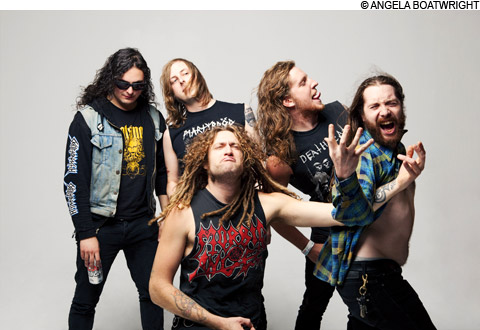
PRESSING MATTER Jonah Livingston created Teenage Disco Bloodbath Records in 2003 after a musician neighbor had a record but didn't know what to do with it. |
Jonah Livingston was a student at Northeastern's Music Industry program when his next-door neighbor told him that his band, Raise the Curtain, had a record but didn't know what to do with it. "That was right around the time I was getting into DIY and booking basement shows," says Livingston. "The program was talking about copyright laws and things that are important in the mainstream music industry, but I wasn't getting anything about, 'If I want to put out a record tomorrow, where do I start?' " So Livingston went for it. He used his savings to put out a split 12-inch, and Teenage Disco Bloodbath Records was born.That was 2003, but nearly a decade later, with the music industry still in flux, aspiring independent labels still have to learn by doing. And right here in Boston, more and more are giving it a shot, from newer labels like Topshelf Records, YDLMIER Tapes, and Polk, to veterans like TBD, Deathwish, Dopamine, and Midriff Records.
In the age of the digital self-release, it can seem like all it takes are some social media skills to propel yourself to buzz-band stardom. "I see some bands doing the self-release thing, taking DIY to a very real level and doing it well," says Kevin Duquette, who co-founded Topshelf Records in 2006 with Seth Decoteau as a means to release his band's music and the music his friends were making. "I can throw something up on Bandcamp, I can give it away for free, and next thing I know I have fans, people like what I'm doing, and I haven't even played a show." As Topshelf snowballed, it became clear to Duquette just how necessary the band-label model still was. "There's something to be said for having any sort of support behind you, having someone handling the promotion, the physical production of the record. . . . There are a lot of subtle nuances."
But the role of an indie label extends way beyond moving and shaking. In January, Mike Sniper, founder of the Brooklyn-based Captured Tracks (Beach Fossils, Widowspeak) called out "indie" labels who only signed bands with existing blog buzz, saying that a label that didn't bother with debut releases was just "a manufacturing plant with a cool logo." He had a point. Power in the music industry is concentrated in the hands of just three major labels — Sony, Warner, and Universal currently control over 80 percent of the US music market. But even among the bigger indies who need to support a full-time staff, profit has become a priority. "They won't be rewarded for taking a chance," says Jordan Lee, who runs tape label Kassette Klub. "They'll be rewarded for signing someone who's got mass appeal, who tours a lot, who has a good image, and who'll make them money."